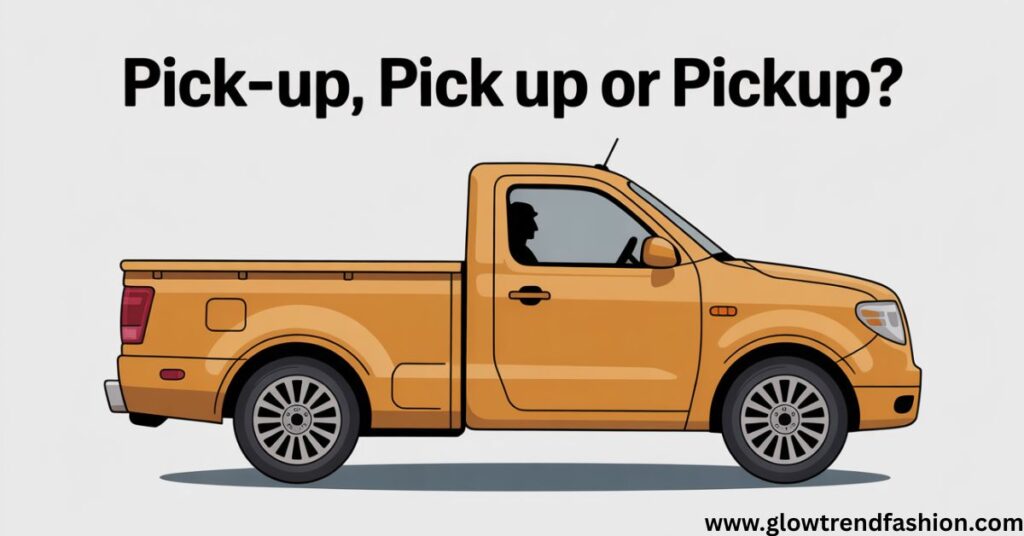Pick up is one of those deceptively simple phrases in English that can leave even native speakers scratching their heads. Is it one word, two words, or hyphenated? The answer depends on how you’re using it. From emails to invoices, job orders to delivery schedules, choosing between pickup, pick up, and pick-up can shift the tone, precision, or even clarity of your message.
Imagine you’re sending a work email: “Hey Amanda, can you pick up the package from reception?” That one small word might trip up your spell checker and a few readers, too. Is it wrong? Not necessarily—but it may not be the best choice depending on your intent. Let’s untangle this trio of terms with examples, origins, and pro tips that clarify their use in modern English.
Whether you’re writing for business, sending a casual message, or crafting professional content for an interior blog post, knowing whether to say “pick up or pick-up”, or if “pickup” is one word, will save you from awkward phrasing and confusion. We’ll walk through it all—clearly and with lots of examples.
What to say instead of What’s the Correct Usage?
pickup – used as a noun or adjective (e.g., pickup truck, pickup time)
pick up – used as a verb phrase (e.g., pick up samples, pick up speed)
pick-up – hyphenated form, mostly outdated or formal, used as a noun or adjective
Why the Confusion Exists
The confusion between pickup, pick up, and pick-up boils down to grammar roles. When you use it as a noun or adjective, it’s usually pickup or pick-up. When it’s a verb phrase, it’s pick up. The forms often sound identical when spoken, but have different meanings and grammatical functions in writing.
Technology adds another layer of ambiguity. Autocorrect often favors pickup regardless of context. That’s why many wonder: “Is pickup one word?” or “Should I use pick up or pick-up?”.
Understanding “Pick Up” (Verb Phrase)

When you use pick up as a verb, you’re describing an action – to collect, to lift, or to acquire something.
Example (Email):
Hi James,
Can you pick up the rug samples from the supplier before 5 PM?
Thanks,
Marissa
In this case, “pick up” is a clear verb phrase. You’re asking James to perform an action: to collect or retrieve something.
Pro Tip: Whenever you can replace “pick up” with another verb like fetch, gather, or acquire, you’re likely working with a verb form, so always keep it two words: pick up.
What is “Pickup”? (Noun or Adjective)
Pickup, as one word, functions as a noun or adjective. It often refers to a thing or concept, such as a vehicle, a scheduled collection, or even momentum.
Example (Delivery Note):
Your pickup is scheduled for 10:00 AM tomorrow at Warehouse B.
Example (Adjective use):
We rented a pickup truck to transport the vintage furniture.
In both cases, “pickup” describes a thing: either an event or a type of vehicle. That’s your cue to use the one-word version.
Pro Tip: If you can substitute the word with collection or retrieval, and it still makes sense, you’re dealing with the noun form: go with pickup.
What About “Pick-Up”? (Hyphenated Form)

Pick-up is considered dated or formal in modern usage but may still appear in certain British or academic texts. It functions similarly to the noun form “pickup”.
Example (Old-style memo):
The scheduled pick-up will occur on Tuesday at 3 PM.
While not incorrect, pick-up is now mostly replaced with the single word pickup in American English.
Pro Tip: Unless your style guide or audience requires hyphenation (e.g., legal or academic publishing), favor pickup over pick-up.
When to Use Each: Quick Guide
| Usage | Form | Example |
|---|---|---|
| Action Verb | pick up | Can you pick up the samples after lunch? |
| Noun | pickup | The pickup is scheduled for 3 PM. |
| Adjective | pickup | He bought a pickup truck for the renovation. |
| Dated Noun | pick-up | The courier has a pick-up scheduled. |
More Examples in Real Context
1. Email to a client (interior design consultation):
Hello Dana,
Just checking if you’ll be able to pick up the mood board from our studio by Friday? We’d love your thoughts before finalizing the textures.
Best,
Eva
2. Text to a teammate:
Can you do the pickup from the tile supplier today?
3. Office notice:
Please confirm your pick-up schedule with the logistics team.
These examples highlight how the context dictates the correct form: pickup or pick up? That’s all about usage.
Synonyms and Related Terms
For pickup/pick-up (noun/adjective):
- Collection
- Retrieval
- Acquisition
- Drop-off
- Fetching
For pick up (verb):
- Collect
- Gather
- Retrieve
- Acquire
- Fetch
Where Did These Terms Come From?
- “Pick up” comes from Middle English, combining “pick” (to grab or select) and “up” (directional adverb).
- “Pickup” evolved over time as a compound noun, initially used in 19th-century railroads and logistics.
- “Pick-up” was the hyphenated transitional form that bridged verbal and nominal usage but is now fading.
Language evolves with usage, and today, pickup has solidified its place as a standalone noun.
Final Thoughts
To wrap up:
- Use pick up for actions (“Can you pick up the sofa?”).
- Use pickup as a thing or event (“The pickup is scheduled.”).
- Use pick-up sparingly, if at all—mostly in formal or older texts.
By paying close attention to function and intent, you’ll never have to second-guess whether to write pick up or pickup. Context is king.

Isa Bella is an experienced fashion blogger at Glow Trend Fashion, passionate about style, trends, and personal expression. With years of expertise in the fashion industry, she shares insightful tips, fashion guides, and the latest style updates.





